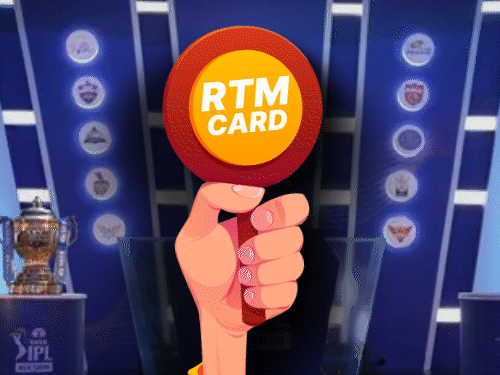The Right to Match card is back in the BCCI’s new retention policy. The board announced the policy last week.
Some teams are not happy with the change in IPL Mega Auction rules. The biggest controversy concerns the change in the right to correspond rule. Some teams also expressed their objection by writing letters to the BCCI.
The board had implemented the league’s new retention policy on September 28, in which the right-to-match card rule returned. Under this rule, if teams fail to retain a player, they will be able to retain him in the mega-auction using the Right to Match card. However, there has been a change that is not appreciated by the teams.
Suppose Rohit Sharma was not retained by Mumbai Indians. His name appeared in the auction and he was bought by Royal Challengers Bangalore for Rs 10 crore. Now, if Mumbai wants, they can keep Rohit with them for Rs 10 crore using the RTM card.
In the 2018 mega auction, Bengaluru had purchased Yuzvendra Chahal via the Right to Match card.
Read the whole topic in other questions?
1. Which rule is contested? The Right to Match card is back in the new retention policy. There has been controversy surrounding this rule. Under this rule, if teams wish, they can keep their undrafted players with them during the auction.
2. What has changed in the rules of the right to correspond to the card? This time, a new clause has been added. According to which teams bidding on the unsuccessful player will have the opportunity to increase the player’s price after the Right to Match card. Suppose Chennai Super Kings have retained 5 players and they have one RTM card left. The team could not retain Moeen Ali. Now, if Hyderabad buys Moeen at auction by paying Rs 6 crore, then Chennai can keep Moeen in their team using their RTM card.
According to the new clause, if Hyderabad offers Rs 6 crore for Moeen and CSK uses the RTM card, then Hyderabad can increase this price to Rs 9 or even Rs 10 crore. Now if CSK uses the RTM card, then they will have to buy Moeen at a higher price. If CSK does not use the RTM card, Moeen will travel to Hyderabad at a higher price.
3. Why was the clause challenged? This clause will result in a loss for the team using the Right to Match card. Either he will have to pay more money or he will have to release the player.
4. What do franchisees say? Some franchisees wrote a letter to the board saying additional opportunities would weaken this rule. The purpose of the Right to Match card is to determine a player’s market value. If a franchise makes an arbitrary offer on a player and that price must be paid by the franchise using the card, then this goal will not be achieved.
5. What is the Council’s reasoning behind the new clause? The board, while announcing the new retention policy on the right to match cards rule, had said that the highest bidder should be given one last opportunity to increase their bid for the player. Only after this can the team holding the Right to Match card exercise their right. The board had also said that this offer could be very significant.
6. How many Right to Match cards can be used? Each team can use a maximum of 6 Right to Match cards in the auction. This card can only be used when the team has not selected any players. This means that as the number of retained players increases, the number of Right to Match cards will decrease.
The IPL mega auction will take place at the end of this year, although the date and venue are yet to be decided.
Also read these news related to IPL auctions
Will the new detention policy harm foreign actors?
The BCCI had announced the new retention policy for the mega auctions a week ago. Many changes have been made. How will these changes affect players and franchises? Will this result in a loss for foreign players or will the franchise have to spend more money? to understand that
Teams will be able to retain 6 players in the mega auction. Dhoni will be able to play as an uncapped player
According to BCCI’s new retention policy, IPL franchises will be able to retain 6 players from this year. Not only that, the Right to Match card is also back. To find out about the new retention policy rules

